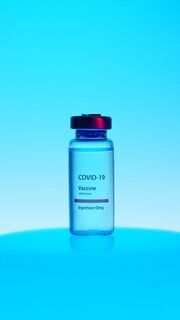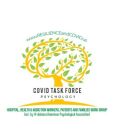Health
How Volunteering to be in a Vaccine Study Gave Me Hope
We all have a unique opportunity to help stop the spread of COVID.
Posted January 26, 2021
This post was written by Dr. Betsy Gard.
The opportunity to join
When I heard about the Moderna COVE (mRNA-1273) study and the openings for volunteers for Phase III testing of mRNA vaccines, I felt a surge of hope as well as anxiety and uncertainty. I know that vaccine studies have a certain amount of potential risk but also enormous benefits. I would have the opportunity to possibly help millions of people, both in the US and across the world by participating.
I would be able to possibly get the vaccine myself, although I had only a 50% chance of receiving the active vaccine. I would be participating in research that could decrease the impact of COVID, its long-term side-effects, the grief, and the mental health fall-out from a worldwide pandemic. I would be carefully monitored for 25 months which meant there would be watchful oversight of my health. I would need to commit to returning to the clinic for blood draws, nose swabs and I would need to chart weekly on a phone app to assess if I had any symptoms or side effects emerge over the duration of the study. After careful consideration and reading pages of information, I decided the benefits outweighed the risks and gave my informed consent.

Entering the study
The clinical staff who spoke with me, the technicians who drew my blood and swabbed my nose, the researchers who answered my questions and were patient with more questions, were outstanding.
They were responsive, sensitive, and efficient. I felt cared about from the moment I entered the study. The shots that I took were painless, which was a surprise. The first shot led to a very minor sore arm, and I was sure I had received the placebo. The second shot, which also was painless when given, caused a bit more soreness, but I was delighted when approximately 24 hours later, there was some redness around the area where I had received the shot. I wanted to receive the active vaccine and hoped this meant I had. I also had some achiness but I did not have fever, chills, nausea, or any other side effects. I wondered which group I had randomized to, as I had expected more adverse reactions. However, I was unblinded the first week of January and to my delight, I was told I had antibodies and I had received the active vaccine, not a placebo.
What is the reluctance to vaccinate?
Although the exact percentage is not known, it is estimated that up to 70-80% of the population will need to be vaccinated to slow the spread of the disease.
In recent studies, the percentage of people willing to take the COVID vaccine greatly varies, depending on when people were surveyed and which demographic group they belong to. Statistics of those planning to take the vaccines range from a high of 70% in individuals with a bachelor’s degree and Caucasian to a low of 38% for those who have a high-school education or less and/or come from other racial subgroups.
In research studying those who post on Twitter, those who are against vaccinations tend to have more beliefs in conspiracies and have more mistrust of the government. Racial and ethnic minorities have histories of being disenfranchised and mistreated by medical and public health projects.
The mandate for vaccines to help protect us and our children has a long-standing history. Our life span has been increased by vaccines that protect against smallpox, diphtheria, whooping cough, tetanus, polio, measles, hepatitis B, and other diseases
Why should we get vaccinated? We need to protect ourselves — and our loved ones, friends, and our country
- Know the numbers: By the end of the first week of January 2021, over 21 million people in the US and 88 million in the world have contracted COVID. In the US, 365,000 people have died and over 1.9 million people worldwide have died worldwide.
- 10-15% develop a severe form of the disease and 5% become critically ill.
- The disease, even in milder forms, can take more than 6 weeks to recover from.
- 35% of those surveyed have not fully recovered, even after 3 weeks.
- Young adults are not immune; 1 in 5 aged 18-34 have prolonged symptoms.
- Long-term side effects may include blood vessel damage, cardiovascular impacts, and scarring of lung tissue. Neurological effects may include strokes, seizures, and Guillain-Barre syndrome.
- We can reduce the risk in our loved ones by reducing our risk of catching COVID by taking the vaccine.
- We can reduce the risk to our communities, our states, and our country by reducing our risk of contracting COVID by taking the vaccine.
- We can promote our economy’s recovery with reducing the spread of COVID by taking the vaccine.
- We can follow the science; even after we have been inoculated, as we need to socially distance, wear a mask and wash our hands.
- We can go to trusted sources of information for updates and new breakthroughs in fighting the pandemic
- We can demonstrate courage by getting vaccinated.

Dr. Gard is an Adjunct Professor at the Emory Department of Psychiatry and Behavioral Sciences. She is a Disaster Mental Health Manager for the Red Cross and both a Trainer and a Facilitator for resiliency programs to the military and their families.
Dr. Gard has provided consultation internationally to communities that have experienced trauma. She provided mental health consultation to the International Rescue Committee with emphasis on trauma, and self-care.
Dr. Gard has a private practice with specialties in trauma work, adopted children, families, and couples. She is a past-president of the Georgia Psychological Association and a board member for the Georgia Psychological Foundation.
References
CDC: Vaccine Effectiveness; How Well do the Flu Vaccines Work? https://www.cdc.gov/flu/vaccines-work/vaccineeffect.htm.
Szilagyi, P., Thomas, K., & Shah, M. 12/29/2020. National trends in the US public’s likelihood of getting a COVID-19 vaccine-April 1 to December 8, 2020. JAMA. doi:10.1001/jama.2020.26419. https://jamanetwork.com/journals/jama/fullarticle/2774711.
Tanushree, M., Counts, S. & Pennebaker, J. 2016. Understanding Anti-Vaccination Attitudes in Social Media. Proceedings of the 10th Annual AAAI Conference on the Web and Social Media. https://www.microsoft.com/en-us/research/uploads/prod/2019/05/antivax-i….
Mayo Clinic. COFID-19 (coronavirus): Long-term effects. https://www.mayoclinic.org/diseases-conditions/coronavirus/in-depth/cor….
Watts. E. January 8, 2021. COVID-19: Research points to the long-term neurological effects. Medical News Today. https://www.medicalnewstoday.com/articles/covid-19-research-points-to-l… - Importance-of-neurological-symptoms
World Health Organization. January 10th, 2021. Coronavirus disease (COVID-19) Dashboard. https://covid19.who.int/?gclid=EAIaIQobChMI18afqOSR7gIVCuOzCh3S3gUqEAAY….


